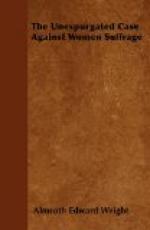But to do the woman suffragist justice, she does not press the argument from chivalry. Inasmuch as life has brought home to her that the ordinary man has quite other conceptions of that virtue, she declares that “she has no use for it.”
Let us now turn to the anti-suffragist view. The anti-suffragist (man or woman) holds that chivalry is a principle which enters into every reputable relation between the sexes, and that of all the civilising agencies at work in the world it is the most important.
But I think I hear the reader interpose, “What, then, is chivalry if it is not a question of serving woman without reward?”
A moment’s thought will make the matter clear.
When a man makes this compact with a woman, “I will do you reverence, and protect you, and yield you service; and you, for your part, will hold fast to an ideal of gentleness, of personal refinement, of modesty, of joyous maternity, and to who shall say what other graces and virtues that endear woman to man,” that is chivalry.
It is not a question of a purely one-sided bargain, as in the suffragist conception. Nor yet is it a bargain about purely material things.
It is a bargain in which man gives both material things, and also things which pertain perhaps somewhat to the spirit; and in which woman gives back of these last.
But none the less it is of the nature of a contract. There is in it the inexorable do ut des; facio ut facias [give me this, and I will give you that; do this for me, and I will do that for you].
And the contract is infringed when woman breaks out into violence, when she jettisons her personal refinement, when she is ungrateful, and, possibly, when she places a quite extravagantly high estimate upon her intellectual powers.
We now turn from these almost too intimate questions of personal morality to discuss the other grievances which were enumerated above.
With regard to the suffragist’s complaint that it is "insulting" for woman to be told that she is as a class unfit to exercise the suffrage, it is relevant to point out that one is not insulted by being told about oneself, or one’s class, untruths, but only at being told about oneself, or one’s class, truths which one dislikes. And it is, of course, an offence against ethics to try to dispose of an unpalatable generalisation by characterising it as “insulting.” But nothing that man could do would be likely to prevent the suffragist resorting to this aggravated form of intellectual immorality.
We may now turn to the complaint that it is “illogical” to withhold the vote from women.
This is the kind of complaint which brings out in relief the logical endowment and legislative sagacity of the suffragist.
With regard to her logical endowment it will suffice to indicate that the suffragist would appear to regard the promulgation of a rule which is to hold without exception as an essentially logical act; and the admission of any class exception to a rule of general application as an illogicality. It would on this principle be “illogical” to except, under conscription, the female population from military service.




